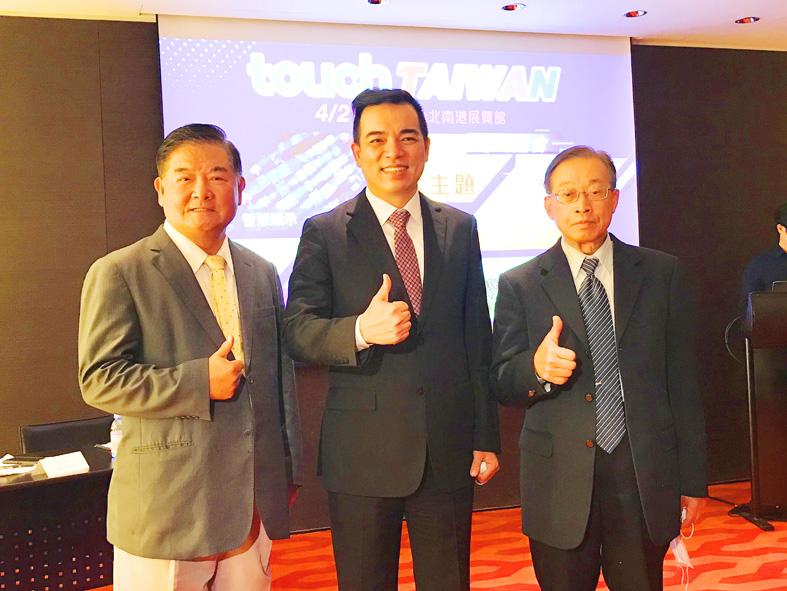AU Optronics Corp (友達光電) is planning to expand capacity amid strong demand for high-end display panels used in premium notebook computers and monitors during the post-COVID-19 pandemic period, the company said yesterday.
The firm plans to boost capacity at its sixth-generation plant in Kunshan, China, to about 36,000 sheets per month from 27,000 sheets, AU Optronics said, adding that the expansion would be ready in the third quarter of next year.
The NT$50 billion (US$1.76 billion at the current exchange rate) plant, built in 2016, was design to be expandable to 45,000 sheets per month, the firm said.

Photo: Chen Mei-ying, Taipei Times
The facility manufactures power-efficient low-temperature polysilicon flat panels for premium notebook computers and monitors targeting online gamers, it added.
“Demand for high-end monitors with a curved display has been rising not only based on gaming demand amid the pandemic, but also due to many people who will continue working from home in the post-pandemic period,” AU Optronics president Frank Ko (柯富仁) told reporters on the sidelines of a news conference ahead of the annual Touch Taiwan trade show, which is to take place at the Taipei Nangang Exhibition Center for three days from Wednesday next week.
The company is also to allocate manufacturing capacity for panels used in notebook computers and monitors, Ko said.
This would result in a capacity increase, he said, without elaborating.
AU Optronics’ board of directors last month approved capital expenditures of NT$455 million for technology and capacity optimization and adjustments.
The firm’s factories are to be fully utilized until next quarter, Ko said, adding that it cannot serve all orders.
Supply of key components would further deteriorate this quarter compared with the past two quarters, Ko said.
In addition to a persistent IC supply shortage, supply has tightened for materials and components from display glass substrates to printed circuit boards and polarizers, he said.
“The supply constraints prevail through the whole flat-panel industry supply chains,” Ko said, adding that component and material supply cycles extended to eight weeks from four weeks before the pandemic.
Component prices are also rising, Ko said, adding that panel makers have increased prices to reflect higher manufacturing costs.
Glass supplier Corning Inc last month said that it would increase glass prices moderately this quarter due to higher logistics, energy, raw material and other operational expenses due to a glass shortage.
The prices of notebook computers panels climbed 2.7 percent month-on-month this month, outpacing the uptick of 2 percent for 55-inch TV panels and 1.2 percent for 27-inch monitors, market researcher TrendForce Corp (集邦科技) said.

To many, Tatu City on the outskirts of Nairobi looks like a success. The first city entirely built by a private company to be operational in east Africa, with about 25,000 people living and working there, it accounts for about two-thirds of all foreign investment in Kenya. Its low-tax status has attracted more than 100 businesses including Heineken, coffee brand Dormans, and the biggest call-center and cold-chain transport firms in the region. However, to some local politicians, Tatu City has looked more like a target for extortion. A parade of governors have demanded land worth millions of dollars in exchange

Hong Kong authorities ramped up sales of the local dollar as the greenback’s slide threatened the foreign-exchange peg. The Hong Kong Monetary Authority (HKMA) sold a record HK$60.5 billion (US$7.8 billion) of the city’s currency, according to an alert sent on its Bloomberg page yesterday in Asia, after it tested the upper end of its trading band. That added to the HK$56.1 billion of sales versus the greenback since Friday. The rapid intervention signals efforts from the city’s authorities to limit the local currency’s moves within its HK$7.75 to HK$7.85 per US dollar trading band. Heavy sales of the local dollar by

Taiwan Semiconductor Manufacturing Co’s (TSMC, 台積電) revenue jumped 48 percent last month, underscoring how electronics firms scrambled to acquire essential components before global tariffs took effect. The main chipmaker for Apple Inc and Nvidia Corp reported monthly sales of NT$349.6 billion (US$11.6 billion). That compares with the average analysts’ estimate for a 38 percent rise in second-quarter revenue. US President Donald Trump’s trade war is prompting economists to retool GDP forecasts worldwide, casting doubt over the outlook for everything from iPhone demand to computing and datacenter construction. However, TSMC — a barometer for global tech spending given its central role in the

An Indonesian animated movie is smashing regional box office records and could be set for wider success as it prepares to open beyond the Southeast Asian archipelago’s silver screens. Jumbo — a film based on the adventures of main character, Don, a large orphaned Indonesian boy facing bullying at school — last month became the highest-grossing Southeast Asian animated film, raking in more than US$8 million. Released at the end of March to coincide with the Eid holidays after the Islamic fasting month of Ramadan, the movie has hit 8 million ticket sales, the third-highest in Indonesian cinema history, Film